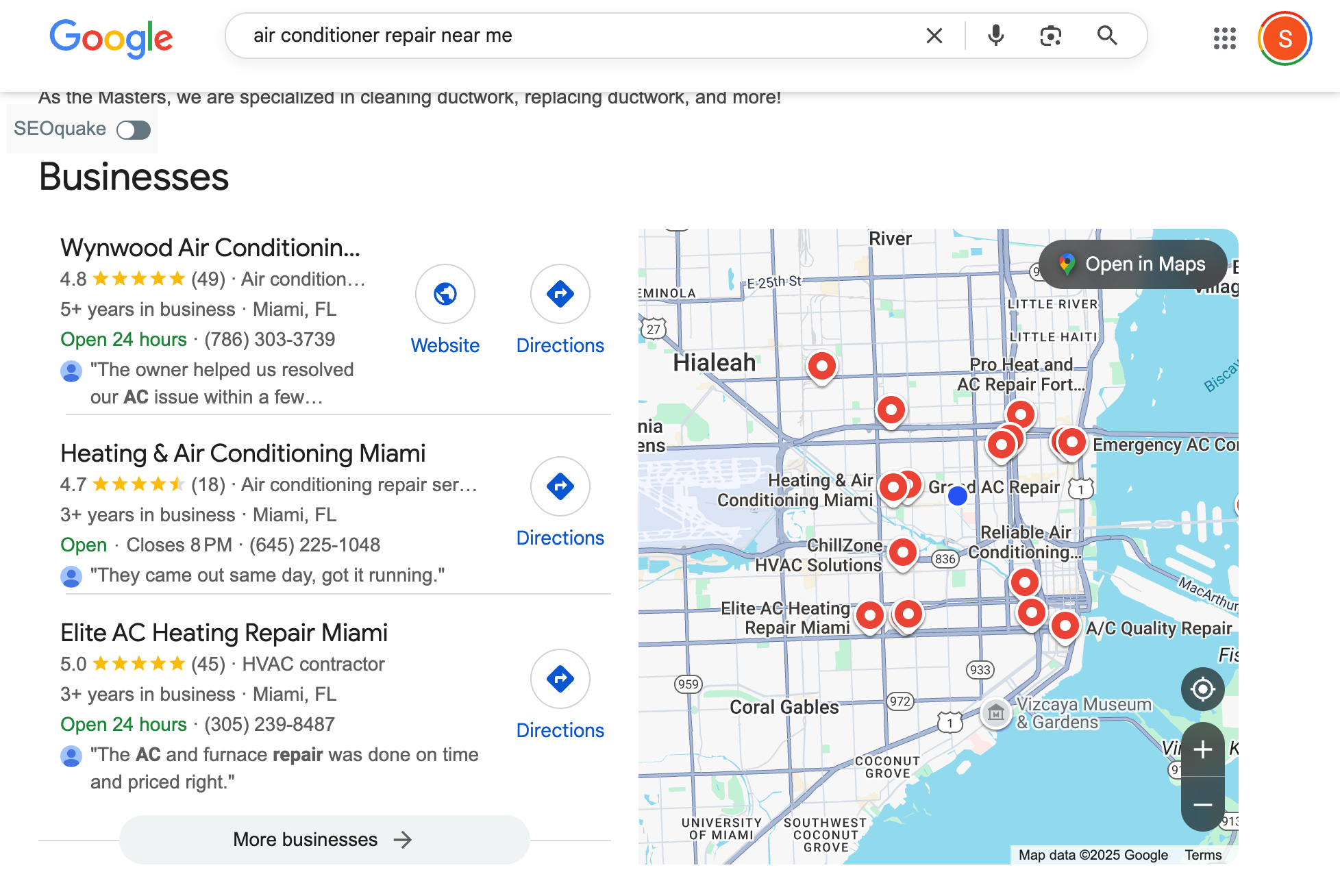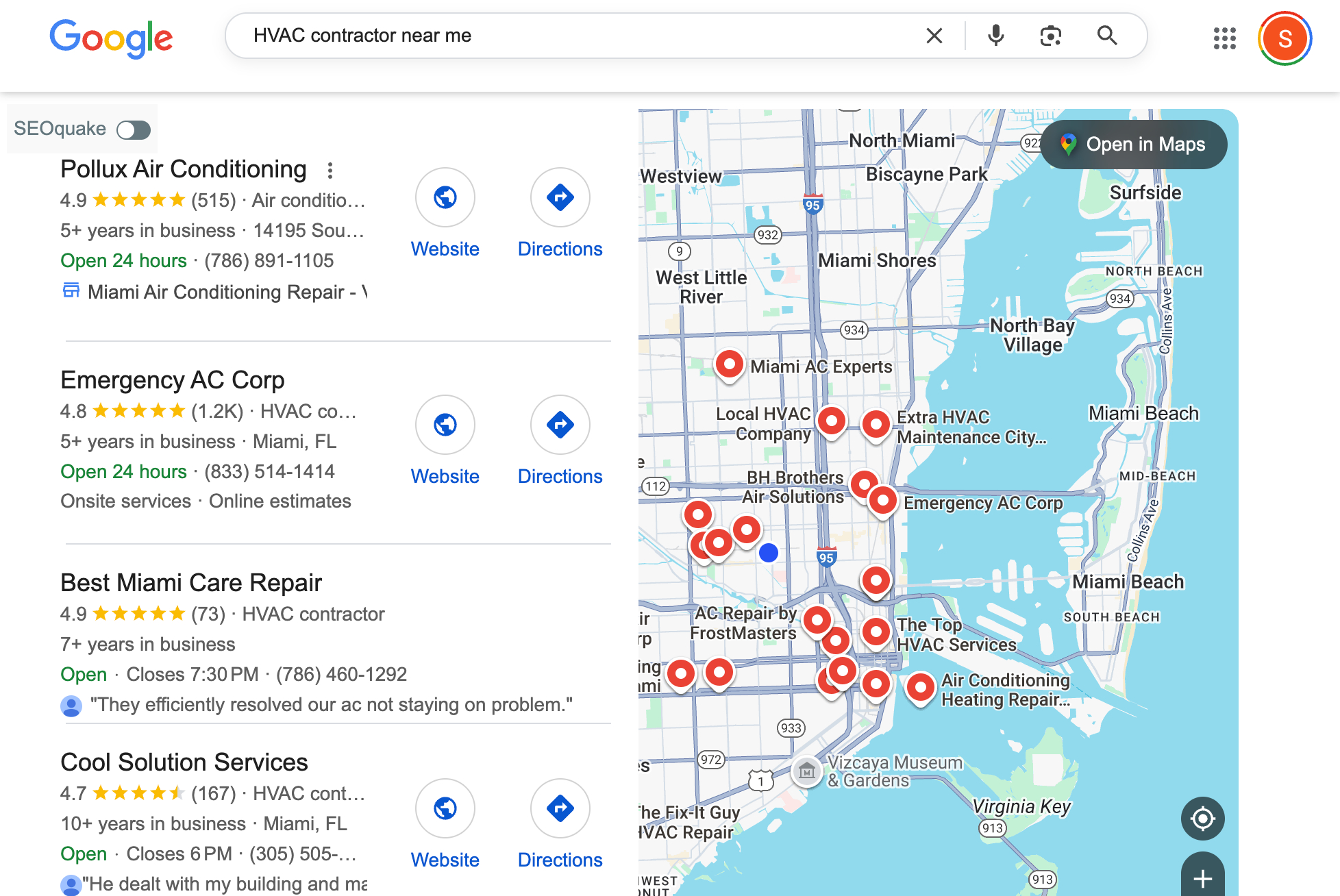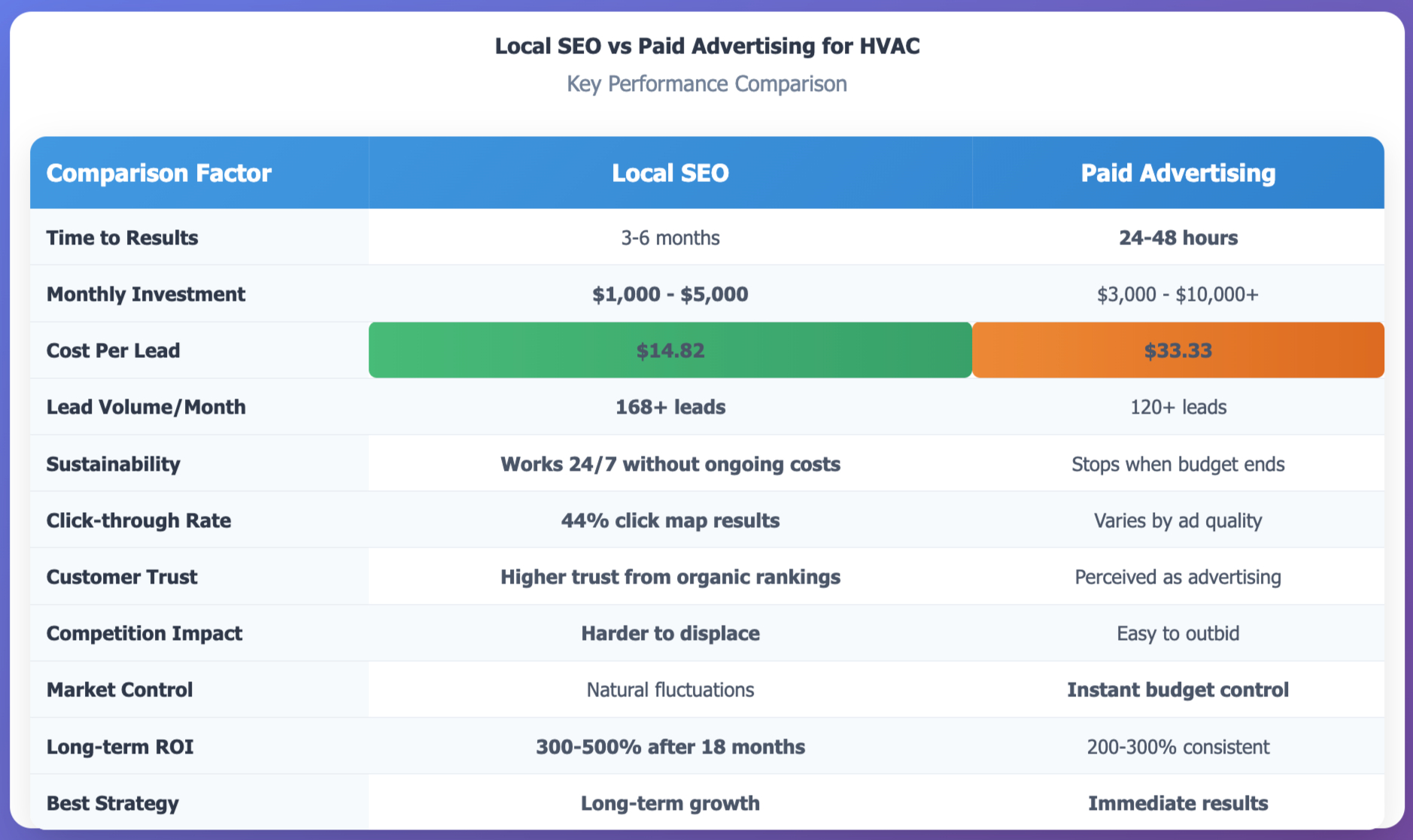When a homeowner’s air conditioning fails on a sweltering summer day, where do they turn?
In most cases, they grab their phone and search “HVAC repair near me” on Google. Where your HVAC company appears in those search results can make the difference between landing that emergency service call or watching it go to a competitor.
Despite the evolving landscape of online search with paid ads, local service ads, and AI-powered search engines gaining ground, Google Maps remains the dominant force in local HVAC lead generation.
Understanding how to optimize your Google Business Profile for local search isn’t just a marketing tactic; it’s essential for sustainable business growth in the HVAC industry.

Understanding Local SEO for HVAC Companies
Local SEO represents a specialized branch of search engine optimization and HVAC marketing services focused on helping HVAC businesses appear in location-based search queries. Unlike traditional SEO services that target broad national audiences, local SEO strategies help HVAC contractors connect with potential customers in their immediate service areas. When homeowners search for “AC repair” or “heating services near me,” local SEO ensures your HVAC business appears prominently in search engine results.
The difference between Google My Business and SEO lies in scope and implementation. Google My Business (now called Google Business Profile) serves as your digital storefront on Google’s platform, while SEO encompasses broader website optimization and online visibility strategies. However, your Google Business Profile significantly affects SEO performance, particularly for local terms. Optimizing your Google Business Profile represents one of the most effective local SEO efforts any HVAC company can undertake.
For contractors, local HVAC SEO campaigns focus on capturing nearby customers actively seeking heating, ventilation, and air conditioning services. These search queries often indicate immediate need, making them incredibly valuable for HVAC businesses looking to increase their conversion rates and generate more qualified leads.
Why Google Maps SEO Still Matters for HVAC Services
The numbers tell a compelling story about local search performance. Recent data shows that 71% of clicks still go to organic search results, with 67% going to the first five results. Even more striking, 44% of all clicks go to the top three Local rankings – what’s known as the “three-pack.”
This means that despite the proliferation of paid advertising options, nearly half of your potential customers are clicking directly on Google Maps results when they need HVAC services. For HVAC contractors, this represents thousands of potential leads and hundreds of thousands in revenue annually from digital marketing services alone.
Consider these real-world examples: An HVAC company in Nevada spends $2,500 monthly on online marketing and tracks 168 leads per month at an average cost of $14.82 per lead. The majority of these leads come directly from Google rankings. Without strong map visibility, their cost per lead would skyrocket, and their organic opportunity would virtually disappear.
Similarly, competitive markets like New York and Miami demonstrate the critical importance of proper optimization. In Manhattan, an HVAC contractor competing against hundreds of other companies must rank in the top three map results to capture emergency service calls worth $500-$1,500 each. A properly optimized Google Business Profile can mean the difference between 50 leads per month and 200+ leads per month in such dense markets.

In Miami’s competitive HVAC landscape, companies that dominate Google Maps for searches like “AC repair Miami” or “HVAC contractor near me” often see 100+ leads monthly from organic sources alone. One Miami-based HVAC company tracking their results found that 65% of their service calls originated from Google Business Profile clicks, generating over $120,000 in monthly revenue from organic search visibility.
Is Doing Local SEO Worth It for HVAC Companies?
Absolutely. Local SEO provides exceptional return on investment for HVAC businesses when implemented correctly. Unlike paid advertising that requires continuous spending to maintain visibility, successful HVAC SEO campaigns create lasting organic rankings that generate leads 24/7 without per-click costs.
The investment in local SEO strategies pays dividends through increased website traffic, higher search rankings, and improved online visibility.
Smaller HVAC companies particularly benefit from local SEO because it levels the playing field against larger competitors. A well-executed local SEO campaign can help a local HVAC contractor outrank national franchises in their service area.
Consider the long-term value: while paid ads stop generating leads the moment you stop paying, organic rankings continue driving potential customers to your HVAC business months and years after initial optimization. This makes local SEO one of the most cost-effective marketing efforts available to HVAC companies.

How Much Does HVAC SEO Cost?
HVAC SEO costs vary significantly based on market competition, service area size, and campaign scope. Most professional HVAC SEO services range from $1,000 to $5,000 monthly for comprehensive local SEO campaigns. However, the investment should be evaluated against potential returns.
In competitive markets like Los Angeles or Chicago, HVAC companies investing $3,000 monthly in SEO often generate $30,000-$50,000 additional monthly revenue from improved search rankings. The key lies in working with an experienced HVAC SEO company that understands the unique challenges of marketing heating and air conditioning services.
For smaller HVAC businesses or those just starting their digital marketing journey, basic local SEO efforts might cost $500-$1,500 monthly. This typically includes Google Business Profile optimization, local citations management, and basic keyword research targeting local HVAC services.
Business owners should consider HVAC SEO costs as investments in long-term growth rather than expenses. Unlike temporary advertising campaigns, effective SEO strategies build cumulative value over time, making your HVAC website increasingly competitive in search results.
Understanding Google Business Profile Optimization
Google Business Profile (GBP) optimization involves enhancing every aspect of your business listing to maximize visibility in local search results. GBP stands for Google Business Profile in SEO contexts, representing the evolved version of Google My Business that offers expanded features for local businesses.
Can you do SEO on Google My Business? Absolutely. GBP optimization includes optimizing business descriptions with relevant keywords, selecting appropriate business categories, uploading high-quality images, maintaining accurate business hours, and encouraging Google Business Profile reviews. These optimization efforts directly impact your HVAC company’s ability to appear in local searches.
The optimization process involves several key components:
Business Information Accuracy: Ensure your HVAC company name, address, and local phone number remain consistent across all online platforms. Google uses this information to verify your business legitimacy and determine local search rankings.
Service Area Definition: Clearly define the neighborhoods and cities where you offer HVAC services. This helps Google understand when to display your business for location-specific searches.
Category Selection: Choose primary and secondary categories that accurately reflect your HVAC services. Categories like “HVAC contractor,” “air conditioning repair service,” and “heating contractor” help Google understand your service offerings.
Visual Content: Upload photos showcasing your HVAC team, equipment, completed installations, and office space. Visual content increases engagement and builds trust with potential customers browsing search results.
The Changing Landscape of Local Search
While Maps remains king, the search landscape continues evolving. Google has reduced map results from seven to three listings, making competition fiercer among HVAC companies. Paid ads now appear within map results themselves, and Google Local Service Ads dominate the top of search results for home services companies.
Additionally, AI-powered search engines like ChatGPT are beginning to serve local business results, including map-based recommendations. Though these platforms currently handle only about 500,000 monthly home service searches compared to Google’s 10 million, forward-thinking HVAC contractors should monitor these emerging channels.
Voice search also plays an increasingly important role in local HVAC searches. Customers use voice assistants to find “heating repair near me” or “emergency AC service,” requiring HVAC companies to optimize for conversational queries and long tail keywords.
The key insight here is that while diversification matters, Google Maps optimization should remain your primary focus for organic lead generation. Other search engines and platforms complement your primary SEO efforts but shouldn’t replace comprehensive Google optimization.
Common Issues Harming Your HVAC Company’s Map Rankings
Before diving into advanced optimization strategies, it’s crucial to identify potential issues that might be suppressing your search rankings. Many established HVAC companies unknowingly have problems that stem from past marketing efforts or setup mistakes.
Location and Service Area Issues: You need a legitimate business address in each city where you want to rank for local searches. Proximity to the search location significantly impacts rankings. If you’re trying to rank for multiple cities, consider whether you have actual office locations or clearly defined service areas that justify those rankings.
Past Spam Attempts: Google has become increasingly sophisticated at identifying fake listings. If your company or a previous marketing agency set up multiple fake locations using UPS stores or residential addresses, these could be dragging down your overall authority. It’s better to clean up fake listings and focus on optimizing legitimate locations.
Inconsistent Business Citations: Your Name, Address, and Phone number (NAP) must remain consistent across all online platforms. Even small discrepancies—like “St.” versus “Street” or including/excluding suite numbers—can confuse Google’s algorithms and hurt your local search performance.
Category and Name Spam: Adding your city name to your business name or stuffing keywords into categories might provide short-term gains but often results in penalties. Google’s algorithms detect and penalize these practices, ultimately harming your long-term search rankings.
Review Neglect: Beyond just collecting reviews, you need recent positive reviews. Review velocity (how frequently you receive new reviews) signals to Google that you’re an active, legitimate business deserving of prominent placement in search results.
The Four Pillars of HVAC Google Maps SEO
1. Optimize Your Google Business Profile
Your Google Business Profile serves as your digital storefront for local customers. Every element should be carefully optimized to signal authority and relevance to search engines.
Complete Every Section: Upload a professional logo, team photos showing actual HVAC technicians, and high-quality images of your work. Include detailed business descriptions that naturally incorporate relevant keywords without over-optimization. Highlight your specialties, whether you offer AC repair services, heating installation, or comprehensive HVAC maintenance.
Verify Properly: Use Google’s video verification process when possible. This involves a live video call with a Google representative where you demonstrate your actual business location and signage. This method provides stronger verification than simple postcard verification and can significantly impact your local search rankings.
Maintain Consistency: Use your actual business name, a local phone number (not a toll-free number), and your real business address. While you can add tracking numbers for analytics purposes, maintain the original number for consistency across all business listings.
Leverage Available Features: Regularly post updates about your HVAC services, respond to all Google reviews (both positive and negative), and use the FAQ section to address common customer questions about heating, ventilation, and air conditioning services.
Business Hours Strategy: Consider offering 24/7 emergency services or at least having an answering service. HVAC emergencies don’t follow business hours, and Google may reduce your visibility during times when you’re marked as closed. Many successful HVAC companies find that extending their listed availability increases their appearance in local search results.
2. Build Authoritative Local Citations
Business citations represent online references to your HVAC company’s NAP information across various websites and directories. Think of them as digital confirmations that your business exists and operates at specific locations within your local market.
The challenge lies in maintaining consistency across hundreds of potential listing sites. Many HVAC companies update their information on Google but neglect the dozens of other directories that feed information to major platforms, creating inconsistencies that hurt local SEO performance.
Industry-Specific Directories: Beyond general business directories, focus on HVAC-specific platforms and local business directories in your service areas. Industry specific directories often carry more weight for relevance and can significantly improve your local search performance.
Consistency Across Platforms: Every listing should display identical information. Even small variations can confuse search algorithms and dilute your authority. This includes ensuring your website URL, business description, and service categories remain consistent across all platforms, including Yelp, Angie’s List, and other local directories.
3. Develop a Strategic Review Management System
Google reviews and positive customer reviews serve as social proof for potential customers and important ranking factors for search engines. The most successful HVAC companies have systematic approaches to generating consistent, authentic reviews that improve both their online reputation and search rankings.
How Can I Encourage Customers to Leave Reviews?
Automate the review generation process by connecting your request system to your service management platform (ServiceTitan, FieldEdge, HouseCall Pro, etc.). When a service call is marked complete, automatically send review requests via email and text message to maximize response rates.
Train your HVAC technicians to provide exceptional service and naturally mention reviews during customer interactions. A simple “We’d appreciate if you could share your experience online” delivered at the right moment can significantly increase response rates. Many successful HVAC contractors find that requesting reviews immediately after resolving common HVAC issues yields the best results.
Create a company culture around online reputation management. Celebrate positive reviews during team meetings and recognize technicians who consistently generate positive customer feedback. Make online reputation a company-wide priority that extends beyond your marketing efforts.
Response Strategy: Every review, positive or negative, deserves a thoughtful response. This demonstrates to potential customers that you care about feedback and provides additional signals to search about your engagement level. Responding to reviews also offers opportunities to naturally incorporate relevant keywords and location terms that can improve your local SEO performance.
4. Optimize Your HVAC Website for Local Search
Your HVAC website serves as the foundation for all your local marketing efforts. Specific on-page optimizations can significantly impact your Google rankings and overall search visibility.
Service Area Pages: Create dedicated landing pages for each city and major service area where you offer HVAC services. These pages should include unique, valuable content about your services in those specific locations. Include local keywords naturally within the content, such as “AC repair in [City Name]” or “heating services for [Neighborhood].”
Service-Specific Pages: Develop comprehensive pages for each HVAC service you offer: air conditioning repair, heating installation, duct cleaning, indoor air quality assessment, and emergency HVAC services. Each unique service page should target relevant local keywords while providing valuable information to potential customers.
Technical Optimization: Ensure fast loading speeds, mobile responsiveness, and proper schema markup. These technical factors increasingly influence local search rankings as Google prioritizes user experience. Your website should perform well on mobile devices, as many local searches occur on smartphones.
Content Marketing Strategy: Regularly publish helpful content addressing common HVAC issues and seasonal maintenance tips relevant to your local climate. This demonstrates expertise to both search engines and potential customers while providing more opportunities to rank for relevant long tail keywords.
Meta Descriptions and Title Tags: Craft compelling meta descriptions and title tags that include your primary local keywords and city name. These elements appear in search results pages and influence click-through rates, which can impact your overall search rankings.
Advanced Local SEO Strategies for Competitive HVAC Markets
In highly competitive HVAC markets, basic optimization may not suffice to achieve top search rankings. Advanced local SEO strategies can provide the edge needed to outrank established competitors and capture more local customers.
Local Link Building: Develop relationships with local organizations, sponsor community events, and create partnerships with complementary businesses. These authentic local connections provide powerful ranking factors that search engines value highly. Consider partnering with local home improvement stores, real estate agencies, or property management companies for mutual referrals and link opportunities.
Multi-Location Strategy: If you serve multiple markets, carefully consider whether separate locations or service area business models work better for your specific situation. Each approach has distinct optimization requirements and can significantly impact your local search performance.
Competitive Analysis: Regularly monitor competitors’ local SEO strategies, keyword rankings, and local search performance. Understanding your competitive landscape helps identify opportunities and threats in your local market. Use this intelligence to adjust your own SEO strategies and stay competitive.
Voice Search Optimization: Optimize for conversational queries as more customers use voice search to find local HVAC services. Focus on natural language patterns and question-based keywords that people might speak rather than type.
Measuring Local SEO Performance with Google Analytics
Google Analytics provides invaluable insights for tracking your local SEO performance and measuring return on investment. Understanding these metrics helps HVAC companies optimize their efforts and make data-driven decisions about their digital presence.
What are the Benefits of Using Google Analytics for Local SEO?
Website traffic metrics reveal how many potential customers find your local HVAC business through organic search. Track which pages receive the most traffic, how long visitors stay on your site, and which content generates the most phone calls or contact form submissions.
Local search performance data shows which keywords drive the most qualified traffic to your HVAC website. Monitor rankings for your most important location and service combinations to identify opportunities for improvement.
Conversion tracking measures how effectively your website for contractors turns visitors into leads and customers. Set up goals to track phone calls, contact form submissions, and service appointment requests generated through organic search traffic.
Geographic data reveals which neighborhoods and cities generate the most website traffic and leads. This information helps HVAC companies optimize their service area focus and allocate marketing resources more effectively.
The Future of Local HVAC Search
While Google Maps remains dominant, successful HVAC firms are preparing for an evolving search landscape. AI-powered search engines are beginning to provide local business recommendations, and voice search continues growing in popularity among consumers seeking local services.
The fundamentals remain consistent across all platforms: provide excellent HVAC services, maintain accurate business information, gather authentic positive reviews, and create valuable online content. These principles will serve your HVAC business well regardless of how search technology evolves.
Smart HVAC companies are also optimizing for emerging technologies while maintaining their core SEO efforts. This includes ensuring their Google Business Profile information appears accurately across voice assistants and preparing for potential changes in how search engines display local results.
Building a Successful HVAC SEO Campaign
Creating a successful HVAC SEO campaign requires consistent effort across multiple channels and platforms. Start by conducting thorough keyword research to identify the most valuable search terms for your local HVAC services. Focus on terms that combine your services with location modifiers, such as “heating repair [city name]” or “AC installation near me.”
Develop unique content that addresses your local audience’s specific needs and concerns. Consider seasonal factors that affect HVAC demand in your area, such as extreme weather conditions or common equipment failures. This localized approach helps your content rank higher in search results while providing genuine value to potential customers.
Monitor your local SEO game regularly through ranking reports, website analytics, and customer feedback. SEO performance requires ongoing attention and adjustment as search algorithms evolve and competition changes. Regular monitoring helps identify issues before they significantly impact your search rankings.
Conclusion and Next Steps for HVAC Contractors
Local SEO represents one of the most effective long-term marketing strategies available to HVAC companies. Unlike paid advertising that requires continuous investment, successful local SEO efforts create lasting organic rankings that generate leads around the clock.
Start with an audit of your current Google Maps presence and local SEO performance. Check your business information consistency across all platforms, review your Google Business Profile completeness, and analyze your current review generation process. Many HVAC companies discover significant opportunities for improvement during this initial assessment.
If you’re not currently ranking in the top three map results for your most important local keywords, you’re missing substantial revenue opportunities. The investment in proper local SEO typically pays for itself many times over through increased lead volume and lower customer acquisition costs.
Remember that local SEO for HVAC companies is not a one-time project but an ongoing process. Search algorithms continue evolving, competition increases, and customer behavior changes. Successful HVAC companies treat local search optimization as an essential business function, not a marketing afterthought.
The homeowners in your service area are searching for HVAC services right now. The question is: will they find your company, or will they find your competitors? With proper Google Maps optimization and comprehensive local SEO strategies, you can ensure your HVAC business captures its fair share of local search traffic and converts those searches into profitable service calls.
Focus on providing exceptional service, maintaining consistent online information, and building authentic relationships with your local community. These foundational elements, combined with technical optimization and strategic content creation, will position your HVAC company for long-term success in local search results and help you stay competitive in an increasingly digital marketplace.

